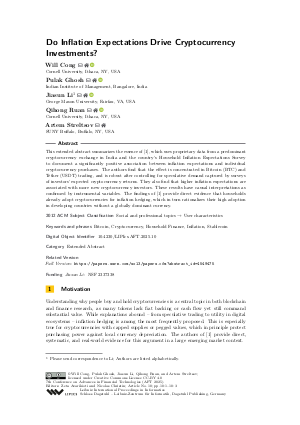Do Inflation Expectations Drive Cryptocurrency Investments? (Extended Abstract)
Authors
Will Cong  ,
Pulak Ghosh
,
Pulak Ghosh  ,
Jiasun Li
,
Jiasun Li  ,
Qihong Ruan
,
Qihong Ruan  ,
Artem Streltsov
,
Artem Streltsov
-
Part of:
Volume:
7th Conference on Advances in Financial Technologies (AFT 2025)
Part of: Series: Leibniz International Proceedings in Informatics (LIPIcs)
Part of: Conference: Advances in Financial Technologies (AFT) - License:
 Creative Commons Attribution 4.0 International license
Creative Commons Attribution 4.0 International license
- Publication Date: 2025-10-06
File

PDF
LIPIcs.AFT.2025.10.pdf
- Filesize: 479 kB
- 3 pages
Document Identifiers
Related Versions
Subject Classification
ACM Subject Classification
- Social and professional topics → User characteristics
Keywords
- Bitcoin
- Cryptocurrency
- Household Finance
- Inflation
- Stablecoin
Metrics
- Access Statistics
-
Total Accesses (updated on a weekly basis)
0PDF Downloads0Metadata Views
Abstract
This extended abstract summarizes the essence of [Cong, Ghosh, Li, Ruan, and Streltsov, 2024], which uses proprietary data from a predominant cryptocurrency exchange in India and the country’s Household Inflation Expectations Survey to document a significantly positive association between inflation expectations and individual cryptocurrency purchases. The authors find that the effect is concentrated in Bitcoin (BTC) and Tether (USDT) trading, and is robust after controlling for speculative demand captured by surveys of investors' expected cryptocurrency returns. They also find that higher inflation expectations are associated with more new cryptocurrency investors. These results have causal interpretations as confirmed by instrumental variables. The findings of [Cong, Ghosh, Li, Ruan, and Streltsov, 2024] provide direct evidence that households already adopt cryptocurrencies for inflation hedging, which in turn rationalizes their high adoption in developing countries without a globally dominant currency.
Cite As Get BibTex
Will Cong, Pulak Ghosh, Jiasun Li, Qihong Ruan, and Artem Streltsov. Do Inflation Expectations Drive Cryptocurrency Investments? (Extended Abstract). In 7th Conference on Advances in Financial Technologies (AFT 2025). Leibniz International Proceedings in Informatics (LIPIcs), Volume 354, pp. 10:1-10:3, Schloss Dagstuhl – Leibniz-Zentrum für Informatik (2025)
https://doi.org/10.4230/LIPIcs.AFT.2025.10
BibTex
@InProceedings{cong_et_al:LIPIcs.AFT.2025.10,
author = {Cong, Will and Ghosh, Pulak and Li, Jiasun and Ruan, Qihong and Streltsov, Artem},
title = {{Do Inflation Expectations Drive Cryptocurrency Investments?}},
booktitle = {7th Conference on Advances in Financial Technologies (AFT 2025)},
pages = {10:1--10:3},
series = {Leibniz International Proceedings in Informatics (LIPIcs)},
ISBN = {978-3-95977-400-0},
ISSN = {1868-8969},
year = {2025},
volume = {354},
editor = {Avarikioti, Zeta and Christin, Nicolas},
publisher = {Schloss Dagstuhl -- Leibniz-Zentrum f{\"u}r Informatik},
address = {Dagstuhl, Germany},
URL = {https://drops.dagstuhl.de/entities/document/10.4230/LIPIcs.AFT.2025.10},
URN = {urn:nbn:de:0030-drops-247292},
doi = {10.4230/LIPIcs.AFT.2025.10},
annote = {Keywords: Bitcoin, Cryptocurrency, Household Finance, Inflation, Stablecoin}
}
Author Details
Funding
- Li, Jiasun: NSF 2337338
References
- Lin William Cong, Pulak Ghosh, Jiasun Li, Qihong Ruan, and Artem Streltsov. Inflation expectation and cryptocurrency investment. Technical report, National Bureau of Economic Research, 2024. URL: https://www.nber.org/papers/w32945.
